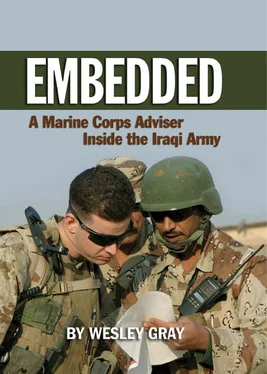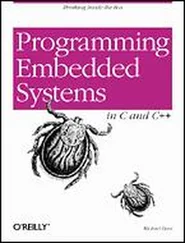I had been living at the FOB in Barwana and had had the opportunity to mentor Lieutenant Ahmed, the 2nd Iraqi Company commander. His actions before an important meeting with all the Barwana area leaders, including local sheiks, the Iraqi Police commander, and the 2/3 Fox Company commander, were a perfect example of how Iraqi cultural traits of laziness, poor leadership, and selfishness lead to poor outcomes. Unfortunately, I wasn’t allowed into the meeting because they wanted the meeting to have a primarily Iraqi face. Instead, I was to make sure that Ahmed, the Iraqi army representative in the town of Barwana, was ready to attend.
About thirty minutes before the 1030 meeting, I went to wake up Ahmed. He was conked out. He looked like a dead body. I tried to wake him. “Ahmed, you know the big meeting is going in thirty minutes. You have to wake up!” He grumbled something in Arabic that I didn’t understand. I gently grabbed him by the shoulder and said, “Ahmed, you are the leader of the Iraqi army in Barwana, you must go to this meeting to represent the army!” Ahmed replied, “Jamal, I was on a patrol last night until 0200. I’m tired. I’m hungry. Who cares about the meeting? Nobody will agree on anything anyway.” Trying to appeal to his anti-Iraqi police stance, I said, “Ahmed, if you don’t go, the only representative for Iraqi security forces will be the Iraqi police commander. Do you want him speaking on the Iraqi Army’s behalf?” Ahmed just turned over in his rack. “Jamal, tell them I am not going. Have one of the jundi go if they need somebody.”
Stunned, I looked as him in disgust as he rolled over on his rack. I thought about how, when I first came to Iraq as an adviser, I would not accept this behavior and would make the Iraqis get up and go. But now, if Ahmed, the leader of the Iraqi Army in Barwana, didn’t have the motivation to help win the war and foster political reconciliation in his small area of Iraq, why the hell should I? America wasn’t in Iraq to win the war for the Iraqis. The Iraqis were here to win the war for the Iraqis—with our help if need be. We could win the war for them, or at least attempt to, but the minute we left, the country would revert to the way things have always been. What is the point of us even helping in the first place, if when we leave the place, it is going to revert to an ass-backwards tribal society in the desert?
Political bickering was evident at not only the local level in the Triad. While the drop in violence was especially promising for the Triad’s future, the continued rhetoric in Baghdad among the Sunni and Shia powers was having direct effects on our ability to accomplish our mission. One day Colonel Abass and Qutaiba, the lead Iraqi construction contractor, received calls from the Ministry of Energy (MOE) and the Ministry of Water (MOW). Their message was direct: all of the contractors and all of the current construction already underway needed to be stopped and moved elsewhere because the land Camp Ali rested upon was officially the property of MOE and MOW and not the property of the MOD. According to the MOE and the MOW, the MOD had not been cleared to commence construction, even though construction had been given the green light many months ago during the project’s planning phases. Talk about a complete waste of money and time. To make matters worse, the Iraqi contractors on base (who were exclusively Sunni) had gone on strike. Now we didn’t even have the personnel to fill in the holes that had already been dug around camp.
It seemed there was a sectarian contest going on between the various ministries that was keeping the project from continuing. I could not pinpoint the reason for the bureaucratic bullshit, but I could pinpoint one direct effect—huge waste. The Iraqi and American governments were going to lose millions of dollars over this because a few guys at the Iraqi ministries couldn’t get along and make a decision that was mutually beneficial to everyone.
When ridiculous bureaucratic decisions are made at the higher level of government in Iraq, the jundi always know what is going on (or at least, they think they do). The most common conspiracy theory I heard from the jundi is that the Shia ministers who dominated power in Baghdad did not want the government spending any more money in Al Anbar and would rather it was spent on projects in support of Shia interests around Baghdad and southern Iraq. I wasn’t sure if their theory was correct, but I imagined there was probably a kernel of truth to it.
Marine Lance Corporals Have All the Answers
Lance Cpl. Andrew “Mac” McMonigal, at the ripe old age of eighteen, summed up the general assessment of our adviser team. We had been sitting on a security cordon in our Humvee for twelve hours during a mission to rid the northern part of Haditha of insurgents. Mac yelled from the Humvee’s turret, “Sir, you want to see my moto [motivational] tattoo?” Tired of listening to lance corporal stories for twelve straight hours, I replied halfheartedly, “Sure Mac, whatcha got?”
McMonigal quickly dropped down into the cab of the Humvee and folded out his bottom lip. He mumbled, “Sir, this is my moto for life. What do you think? Pretty cool, eh?” I glanced at the inside of his lip. Tattooed in thick black ink was “fuck it.” I responded, “Mac, you’ve got to be kidding me. You had ‘fuck it’ tattooed on the inside of your lip? What is wrong with you, man?” Lance Corporal Morgan, the driver, chimed in. “Sir, we’re infantry grunts. Our lives suck. ‘Fuck it’ is our moto.” I laughed. “Yeah, I guess you have a point.”
Part 5
ALL GOOD THINGS MUST COME TO AN END
Chapter 24
Civil War and Democracy in Iraq
December 2006
Ihad a chance to sit down with Colonel Abass while I was fixing his computer. I asked him some deep questions about his thoughts on Iraq’s future, the invasion, and the current state of conflict in the country. Speaking with Colonel Abass was always an eye-opening experience. He had been an Iraqi military commander for twenty-four years. He had lived all over the country and survived, which was a testament to his intelligence and ability to understand his environment.
I listened intently to Abass’s insights. “Jamal, the Americans say they have come to our country to help,” he said. “I believe in their hearts this may be true. But this help reminds me of when the British came here in the sixties and seventies to fix the problems with our palm grove trees, which were infested with disease. They told us that we needed to treat our trees or they would all die of infestation. The Brits convinced us, but the problem only got much worse. All of the palm groves were destroyed. They didn’t help anything, they just made the situation worse.”
Abass shuffled around in his chair, sat upright, and continued. “I believe this second attempt of Westerners to help Iraq is similar to the so-called help the Brits gave us forty years ago.” The room was silent for a moment. I then asked Abass a fundamental question. “Do you think we caused the current crisis in Iraq?” His response was crisp and clear: “Yes, of course.”
Before I could ask him to elaborate on his bold assertion, he ranted about the idea of freedom and why it would never work in Iraq. “The Iraqi people have not known democracy—ever,” he said. “How can we just let them have it? I see democracy and freedom as vaccinations. If you give someone vaccines who has never had any exposure whatsoever, the medicine that is meant to help them will actually kill them. A better method would be to give this medicine slowly and in small chunks so the people could adapt to it. Over time the vaccine would be much more effective.” I sat and thought about his analogy, and it began to make sense.
Читать дальше












